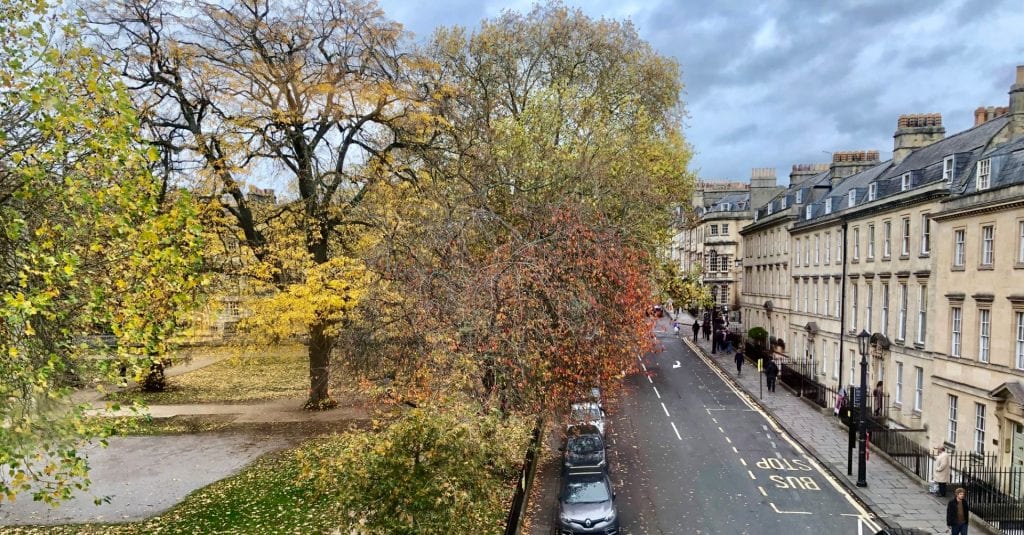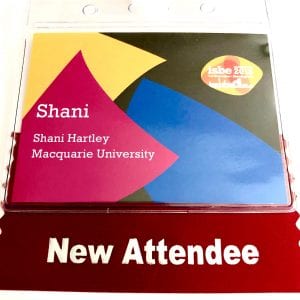A dog chasing its tail
My PhD topic is about investigating enterprise education via three case study schools. I thought coming up with a topic and presenting it in a formal proposal process was going to be the great significant start to my PhD with everything ready to rock and roll from there. I was wrong.
In February, I presented my supervisors with my research concept and then they suggested trying a different angle. I spent a couple of weeks pulling that idea together and then at the next meeting, it was decided a slightly different approach would be better, so again, I spent two weeks twisting the words and concepts around. This pattern continued for over two months when finally we landed back to where we started. I sat in that meeting, feeling like my jaw was on the floor. I’m not sure they were aware just how much we were back at the original idea I presented. Yes, it was a little annoying. However, there were many benefits from taking this circuitous journey. It meant other options could be discounted; it meant my supervisors knew I had thought long and hard about what I was doing; and it helped to clarify and hone the concept. I then had just a few weeks to put together my written proposal and then my presentation.
Sharks
In early May I pitched my PhD proposal to a boardroom of academics and supportive fellow PhD students. I normally make presentations with just some sketched out notes in my hand but this time I had the whole speech written out and I read it almost to the letter. I needed to do it this way to make sure I didn’t miss anything. I think I still kept a reasonable amount of eye contact and I strangely felt the comfort of knowing I was doing a much better job than I had a year earlier with my Master of Research (MRES) proposal. This time I understood more academic theory and addressed theoretical frameworks in detail. During the Q&A session at the end, an academic commented how different I was this time and asked if I could explain. At the MRES proposal I employed a tactic to overcome nerves by being an exuberant presenter, I suppose to compensate for the weaknesses I felt academically. I basically replied to this effect and a sage nod was returned by the academic.
When the general Q&A was over, five people remained with me: the coordinator of PhD students in Education, my supervisors and my two official reviewers (academics) who had gone through the written version in detail before the presentation. By this time I was exhausted but had to concentrate hard to absorb the feedback being given. The funniest moment was when one of the reviewers said there were a lot of fins in my proposal. My brain did a word association of fins to sharks but couldn’t understand what he meant about sharks circling around my work. He repeated the statement. I was still bamboozled. The third time he changed his wording slightly and I suddenly realised he meant I referenced a lot of Finns, academics from Finland!
Overall the advice was very helpful and the PhD coordinator (who I hardly knew at this point but have come to deeply appreciate) was probably the most practical help. Again my befuddled brain had trouble comprehending what was being said. Eventually I understood she had a brilliant idea for my budget timing. You see, at my university, we PhD candidates have up to $3000 each year to fund our research and my research was going to involve a lot of travel. She suggested that I book as much as I can in 2019 for travel in 2020, otherwise I’d be considerably out of pocket in 2020. This was great advice but is my current headache. More on that later.
A kitten
There are four levels of feedback classifications for a PhD proposal. The first is an all clear, full steam ahead with what you proposed. The second is that the proposal is accepted with some minor changes that the supervisors oversee and the reviewers sign-off. The third level requires major changes that the reviewers must examine in detail. And the last brings into question whether you should be doing your PhD at all. My proposal received the second level. My supervisors tried to comfort me about not reaching the top level but I didn’t need comforting. Actually, I was very happy. I knew that my study was always going to be too complicated for an easy approval and also, my reviewers had been chosen specifically to provide thorough feedback. When I looked back at my reaction, I realised the MRES journey had prepared me well for ego bruising in the quest for perfection. My supervisors want what’s best for my PhD, not what’s going to soothe my ego in the short term. I adopted a kitten on the way home as a reward and a comfort. And indeed he has become an amazing companion.
I took less than a fortnight to make the required changes to my proposal and thought, right, I’m on my way. But no, ethics approval hurdle was next.
Humans
When your research involves contact with other humans, approval from a university ethics committee is required. It took some time to put the ethics application together. Almost all students and staff who have been through the process complain bitterly about it. However, I didn’t mind it so much (and no, I haven’t been drinking). Having to spell everything out for ethics approval makes you think in more practical terms the very act of going around, actually doing your research. It was tedious putting together the numerous participant information and consent forms for everyone who is going to be involved in my research but a necessary evil. I had been warned to complete the application form in a Word document because the new online system was shaky and rumour told of people who kept losing their work in the process. The only online issue I had was not receiving the supposed automated email when they had completed the review. I deeply felt the loss of two weeks in which I could have been moving forward. I was able to reasonably quickly address the 20 items brought to my attention and thankfully, the committee then gave their approval within a day or so.
Right, I thought, the hardest part is over, I can move onto recruiting my three case study schools.
Kelpie
Sending emails, reminder emails, playing phone tag, seeking more ethics approval and employing other communication methods to recruit three case study schools made me feel like an online sheepdog. I know from experience how busy teaching can be but when you are the one being overlooked, it is hard to be patient. One school, where my contact was the principal, was great. He agreed to the study almost from the first instance but first I had to go through their school system’s ethics process. After doing the ethics application for uni, this one wasn’t so hard and they were quite prompt at approving too. One down, two to go.
I had to send a few reminder emails to my contact at another school but eventually I received the go ahead to go through their school system’s ethics process. This was even quicker than the one before and after more patient waiting, the principal signed up. Two down, one to go.
The school I wanted most of all was very slow at returning email, although better than the school who didn’t reply at all to my two attempts. As I waited for this school I managed to contact another and talked over the phone to the enterprise coordinator. Their program wasn’t as big as I hoped and wondered if I was doing the wrong thing when I said they weren’t appropriate as a case study school. I did say I’d like to stay in contact though. I might end up interviewing the coordinator as an additional voice in the enterprise education story. At last, right at the end of the school year, the principal of the school I wanted, signed on the dotted line with the university’s ethics approval being sufficient.
Right, the tough part, recruitment, was over. Now I could really begin.
A flying kangaroo
By the time the third school had signed up I had already sat down with the first school for a planning meeting and had scheduled a day with the second school. The first planning meeting was another moment where I felt, finally, the PhD had really commenced. Despite all my nerves beforehand, I had a really enjoyable and productive chat with the principal and we put some plans in place. Phew!
The day booked with the second school was interstate so I flew there and back. Unfortunately I travelled not by the flying kangaroo, Qantas, but by Jetstar. I’m a bit of a snob when it comes to airlines and I have lounge access with Qantas so I was disappointed to be flying out of the wrong terminal, not that I had time anyway, due to the awfully long queues. For the return trip, the queues were even worse because Jetstar’s IT system was down, resulting in a two hour delay and only 10 minutes to scoff breakfast in the lounge. I’m lucky that I have a brother to provide free accommodation reasonably near this school but have to keep the visit short so I don’t have too much personal time reduce the university funding. This visit was not only for a planning meeting but to conduct my first three interviews too. My primary, hands-on, practical research was actually commencing; ten months after my PhD officially started, seven months after the proposal. This was also nerve wracking. As I sat in the school’s boardroom, interviewing and planning next year with the three key people involved in the enterprise education of the school, at times I felt spaced out and overwhelmed but also excited. The PhD was actually happening!
I now have to transcribe the interviews which I recorded on three different devices to determine which would be best for future interviews. Of course it had nothing to do with my phone running out of juice, or the Handy Recorder not working without being plugged into power (turns out, through poor communication between my husband and myself, it had no batteries in it at all).
A budgie
The most difficult time I’m having right now is budgie, I mean budget, related. Since it took so long to recruit schools and have initial meetings with them (not that I’ve met with the third school yet), I haven’t been able to book any travel for next year. The first school that was so quick to become a part of my study is local, so no expense against my budget there. The other two schools are interstate. The planning meeting last week allowed me to schedule dates for the observation phase of my research. All my schools conduct enterprise education on a weekly basis which is good in terms of a consistent approach by the schools but bad for my budget because I will need to be a bird, flying in and out of two other states. I tried to book five trips (10 flights) through the arduous bureaucratic process that is administration at university as soon as I could. First they said bookings made for next year counted against next year’s budget, not the current year. I told them how the PhD Coordinator had informed me otherwise. Then they said they were too busy to arrange all the travel I’d requested. Then when I asked for just one or two trips to be booked before the end of the year, I was just told no, I had to wait until next year.
Well, over the weekend I stewed about it and did my sums, calculating at least $6000 in travel next year, so if I could move $2500 to this year’s budget instead of being out of my own pocket, I was damn well going to fight for it. I sent an email to my supervisor and admin, begging for the trips to be pushed through. An automatic reply informed me the head of admin for the department had left the university. Forever. No wonder she had squashed the idea! I am now waiting for her assistant and my supervisor to respond, hoping against all hope these flights will be booked.
Ding! My email alert. Just as I was writing that last paragraph. Good news? I see the words “We are pleased to advise…” and I am joyous. And then my heart sinks. It is only to declare that I have been deemed to have made satisfactory progress in my Annual Progress Review (APR), on the basis of a form my supervisor and I submitted months ago.
The APR report mentions something about the confusion with my scholarship. Last year I had a scholarship. Word was that if you achieved at least 85 marks for your MRES thesis you kept the scholarship. I received an 89. Woohoo! But no, I found out a month after receiving my result, that it wasn’t the case. I should have read the fine print of the scholarship rules and regulations more closely. These days the government scholarship is worked out on a competitive basis across the university and I was informed it was a particularly competitive year. Doom and gloom took hold! I worked more in casual teaching to pull in some extra money but it was far short of what we thought we were going to have to help pay the mortgage on our new house.
Then, in July, I received a call to say I was going to have the scholarship again but just for Semester 2, funded by the university. It took two months for payments to actually start, with backpay, and then I was told it was now approved for the duration of my PhD, assuming I submit according to the scheduled due date (February 2022). Then, just this week, I was told I had now moved from a department university funded scholarship to a government funded scholarship, the same as I was on in the first place. Now hasn’t that been a fun ride!
Slug
The key moments of my PhD this year have been significant but otherwise I feel I have been rather sluggish in approach, particularly compared to the intensity of my MRES. For instance, I have been periodically working on a systematic literature review but with no looming deadline, I have done a rather poor job of it. Particularly now I have written this piece, I know I have accomplished a lot but I feel I’ve let myself down when it comes to keeping up with this literature review and reading in general. I am going to turn this sluggish approach to slugging it out as soon as I can in the new year. See what I did there! Haha.
Wish me luck!
I wonder what animals will link to my PhD next year.




